Most Common Kanji // The 10 You NEED To Know (with Pronunciation & Examples)
Discover The Most Commonly Used Kanji in Japanese
There are so many different Kanji used in Japanese, but which ones should you focus on learning first? Today we teach you the 10 most common Kanji in Japanese!

You will see these Kanji used everywhere and in many different contexts!
Get ready to dive into the many different ways these Kanji are recycled during your Japanese learning journey!
Oh, and don’t forget, before starting your Kanji adventure it’d be wise to have a good grasp on your Hiragana and Katakana:
- Top tips for learning Hiragana
- Best ways to learn Katakana
These two alphabets are the bread and butter of Japanese and should be understood before moving into the dark world of Japanese Kanji, where the headaches can truly begin!


Most Common Kanji | 上
Most Common Kanji | 下
Most Common Kanji | 出
Most Common Kanji | 入
Most Common Kanji | 見
Most Common Kanji | 学
Most Common Kanji | 行
Most Common Kanji | 会
Most Common Kanji | 生
Most Common Kanji | 思
BONUS | Free Kanji Quiz
Most Common Kanji | FAQ’s
Most Common Kanji #1 | 上
MEANING | Up, Top
This Kanji is used much more than you may think!
It’ll sneak up on you in so many different ways!
Let’s go over a few of those so you can see just how useful learning this most common Kanji is!
| Onyomi | Kunyomi |
|---|---|
| ジョウ, ショウ | うえ、 うわ-、 かみ、 あ(げる)、 のぼ(る)、 たてまつ(る) |
Common Usages of 上
- 上 | Over
- Hiragana | うえ
- Pronunciation | ue
- 上手 | Skilled, Good at, Proficient
- Hiragana | じょうず
- Pronunciation | jouzu
TOP TIP | Get ready for the compliments! The most common compliment you’ll get despite your Japanese level! This is the very word many Japanese speakers use to compliment a Japanese learner’s skill level!
- 以上 | …and upward, … and more
- Hiragana | いじょう
- Pronunciation | ijyou
This is also commonly used at restaurants when you’ve finished listing the food you want to order to the waiter.
You’ll hear people end with “以上です”. Meaning “that’s all”, so the waiter knows you’re done ordering!

- 年上 | Older person, Senior person
- Hiragana | としうえ
- Pronunciation | toshiue
- その上で | In Addition, Moreover
- Hiragana | そのうえで
- Pronunciation | sono ue de
- 階段を上る | To go upstairs
- Hiragana | かいだんをのぼる
- Pronunciation | kaidan wo noboru
- テンションを上がる | To get excited, To get hyped up
- Hiragana | てんしょんをあがる
- Pronunciation | tenshon wo ageru

Combined with many different verbs to show it’s completion or rising up:
- 作り上げる | To build up, To construct
- Hiragana | つくりあげる
- Pronunciation | tsukuriageru
- 取り上げる | To pick up, To take up
- Hiragana | とりあげる
- Pronunciation | toriageru
- 盛り上げる | To swell up, To rise
- Hiragana | もりあげる
- Pronunciation | moriageru
- 打ち上げる | To shoot up, To launch
- Hiragana | うちあげる
- Pronunciation | uchiageru
As seen in the Japanese title of Yonezu Kenshi’s famous song “Fireworks”!
BONUS – if you’ve not checked out our guide on how to learn Japanese through Song Lyrics, you really should!
A couple of phrases to level up your Business Japanese:
- 食べる = 召し上がります | Respectful Japanese used when talking to superiors for the verb “to eat”
- Hiragana | たべる (めしあがります)
- Pronunciation | taberu (meshiagarimasu)
- ご連絡申し上げます | I am (taking the liberty of) getting in touch with you
- Hiragana | ごれんらくもうしあげます
- Pronunciation | gorenraku moushiagemasu
DID YOU KNOW | This is a template phrased used in business writing!
Surnames with 上
- 井上
- Hiragana | いのうえ
- Pronunciation | Inoue
- 上田
- Hiragana | うえだ
- Pronunciation | Ueda
- 上野
- Hiragana | うえの
- Pronunciation | Ueno (also a district in Tokyo)
- 村上
- Hiragana | むらかみ
- Pronunciation | Murakami
- 上海
- Hiragana | シャンハイ
- Pronunciation | Shan hai
DON’T FORGET | 上海 is the special reading for the biggest city in China!
Does this feel like a lot of different contexts for 上?
Just think of how many different usages of ‘up’ there are to learn in English!
Mess up, look up, catch up, touch up, put up, stand up, cheer up, dress up etc
上’s use in Japanese still seems to be quite simple compared to the usage of ‘up’ in English when you think about it!
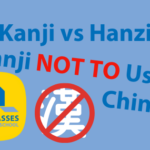
Hanzi vs Kanji // Japanese Kanji NOT To Use in Chinese
Hanzi vs Kanji // Japanese and Chinese have a long history of sharing characters with each other, but it’s not always as simple as that. Find out why…
Most Common Kanji #2 | 下
MEANING | Down, Under
Although it’s the opposite of 上, interestingly enough 下 isn’t used quite as often, but still very common!
Here’s a few examples of where you’ll see 下!
| Onyomi | Kunyomi |
|---|---|
| カ、 ゲ | した、 しも、 もと、 さ(げる)、 くだ(る)、 お(ろす) |
Common Usages of 下
- 下 | Under
- Hiragana | した
- Pronunciation | shita
- 下手 | Not skilled, Terrible
- Hiragana | へた
- Pronunciation | heta

Interestingly enough the opposite of 上手, an example we touched on earlier.
- 下着 | Underwear
- Hiragana | したぎ
- Pronunciation | shitagi
- 部下 | Subordinate person (in business)
- Hiragana | ぶか
- Pronunciation | buka
- 音量を下げてください | Turn the volume down please
- Hiragana | おんりょうをさげてください
- Pronunciation | onryou wo sagetekudasai
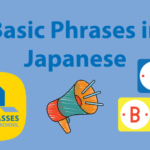
Basic Phrases in Japanese // Learn 32 Essential Phrases (With Flashcards & FREE Quiz)
Basic Phrases in Japanese // Learn these phrases to make your first steps when learning Japanese. We teach you how to get by when speaking basic Japanese.
Most Common Kanji #3 | 出
MEANING | To go out, Exit
Now that we’ve got up and down sorted, let’s go with a few more directional based Kanji that are commonly used, out and in!
Keep an eye out for this Kanji!
If you’re ever in a pickle and need to find the way out, 出 will show you where the exit is! As well as help you remember!
| Onyomi | Kunyomi |
|---|---|
| シュツ、 スイ | で(る)、 だ(す)、 い(でる) |
Common Usages of 出
- 出口 | Exit
- Hiragana | でぐち
- Pronunciation | deguchi

- 出発 | Departure
- Hiragana | しゅっぱつ
- Pronunciation | shuppatsu
TOP TIP | This is commonly said when you are about to embark on an adventure! Or just moving on to the next location. See if you can spot it at an airport, train or bus station in Japan.
- 出演 | Appearance (on a TV show or in a movie)
- Hiragana | しゅつえん
- Pronunciation | shutsuen
Used when mentioning your favourite actor or asking what movies someone has seen, you’ll hear this used often!!
- 出かける | To go out, To depart, To Leave
- Hiragana | でかける
- Pronunciation | dekakeru
We do this almost everyday! Also commonly used to tell someone that they are ‘out’ right now, and not at home.
- 出会う | To meet (by chance), To happen upon
- Hiragana | であう
- Pronunciation | deau
Combined with verbs to show some form of projecting out:
- 思い出した! | I just remembered!
- Hiragana | おもいだした!
- Pronunciation | omoidashita!
You’ll hear this often regarding names, places, or what people had for breakfast after they’ve tried to recall for a bit!
- 飛び出す | To jump out, To break away
- Hiragana | とびだす
- Pronunciation | tobidasu


Most Common Kanji #4 | 入
MEANING | Enter, Insert, To contain
Now that we’ve learned about the exit, let’s learn about how to find the entrance too!
This next Kanji is super useful for when you want to know what’s inside something or where to enter!
| Onyomi | Kunyomi |
|---|---|
| ニュウ | い(る)、はい(る) |
Common Usages of 入

- 入口 | Entrance
- Hiragana | いりぐち
- Pronunciation | iriguchi
The opposite of 出口. When you’re confused as to which door is the actually entrance, look for the word using 入!
- 立ち入り禁止 | No Entry, No trespassing, Off-limits
- Hiragana | たちいりきんし
- Pronunciation | tachiirikinshi
- 入院 | Hospitalisation
- Hiragana | にゅういん
- Pronunciation | nyuuin
Hopefully you don’t have to use this anytime soon, but it may helpful should anyone you know ever end up in the hospital.
- 入学試験 | School entrance examination
- Hiragana | にゅうがくしけん
- Pronunciation | nyuu gakushiken
- 入国 | Entry into a country
- Hiragana | にゅうこく
- Pronunciation | nyuu koku
You’ll probably see this at the airport!
- 入れる | To put something in (into a container)
- Hiragana | いれる
- Pronunciation | ireru
- 入る | To contain, to enter, to join
- Hiragana | はいる
- Pronunciation | hairu
There are many different ways to use 入る! A common one you may see is when asking…
- 何が入ってる?| What is inside (the bag/the food/the room)?
- Hiragana | なにがはいってる?
- Pronunciation | nani ga haitteru?
Most Common Kanji #5 | 見
MEANING | See, Look
The next Kanji you need to learn will show up when you’re trying to show something or see anything!
| Onyomi | Kunyomi |
|---|---|
| ケン | み(る)、 み(せる) |
Common Usages of 見
- 見る | To see, To look
- Hiragana | みる
- Pronunciation | miru
Think about how often you talk about watching, seeing, or looking at something? That’s how often you’ll see this Kanji used in this verb ‘to see’!

- 見せる | To show, To display
- Hiragana | みせる
- Pronunciation | miseru
Used commonly when asking or offering to show a picture, a video, or even a new outfit!
- 意見 | View, Opinion, Comment
- Hiragana | いけん
- Pronunciation | iken
- 初見 | In livestreams this is commonly used when it’s the first time a watcher is meeting the live-streamer!
- Hiragana | しょけん
- Pronunciation | shoken
- 見た目 | Appearance, (outward) looks
- Hiragana | みため
- Pronunciation | mitame
Most Common Kanji #6 | 学
MEANING | To study
Japanese makes it easy to know when studying is involved because they have the Kanji for ‘study’ in all their words!!
This Kanji will soon feel like a study buddy after you see how commonly it’s used!
| Onyomi | Kunyomi |
|---|---|
| ガク | まな(ぶ) |
Common Usages of 学
- 学ぶ | To learn, To study (in depth), To take lessons in
- Hiragana | まなぶ
- Pronunciation | manabu
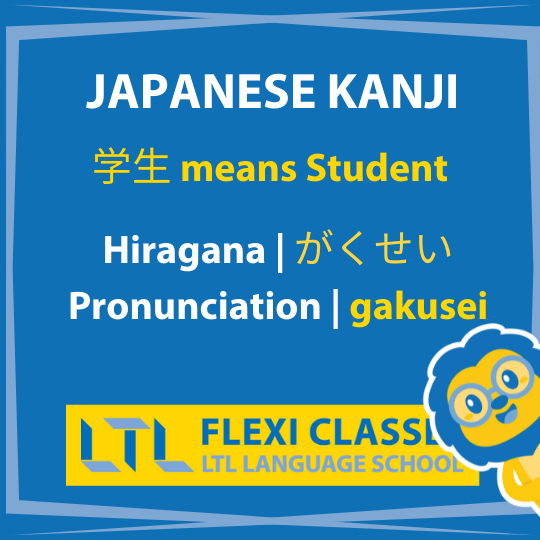
- 学生 | Student
- Hiragana | がくせい
- Pronunciation | gakusei
- 留学生 | Exchange student
- Hiragana | りゅうがくせい
- Pronunciation | ryuugakusei
- 学期 | School semester
- Hiragana | がっき
- Pronunciation | gakki
- 学校 | School
- Hiragana | がっこう
- Pronunciation | gakkou
While doing anything related to school, you will be sure to run into 学 all the time! Remember that most areas of study includes 学, so once you learn this Kanji, you can already write half of the subject names! Here’s just a few examples!
- 数学 | Mathematics
- Hiragana | すうがく
- Pronunciation | suugaku
- 科学 | Science
- Hiragana | かがく
- Pronunciation | kagaku
- 文学 | Literature
- Hiragana | ぶんがく
- Pronunciation | bungaku

How to Use a Japanese Keyboard // A Super Simple Guide
How to use a Japanese Keyboard? How to type in Japanese? Where can I find a Japanese keyboard? We answer all of these questions and more.
Most Common Kanji #7 | 行
MEANING | To go
You won’t get far without knowing when it’s time to go!
Let’s learn just how common the Kanji for ‘to go’ is, as well as the many other ways it’ll appear!
| Onyomi | Kunyomi |
|---|---|
| コウ、 ギョウ、 アン | い(く)、 ゆ(く)、 おこな(う) |
This Kanji actually has many more meanings than just ‘to go’! It can also mean ‘action’, ‘line (of text)’, etc.
Common Usages of 行

- 行く | To go
- Hiragana | いく
- Pronunciation | iku
- 行う | To conduct oneself, To carry out
- Hiragana | おこなう
- Pronunciation | okonau
- 一行 | (One) line of text
- Hiragana | いちぎょう
- Pronunciation | ichigyou
This is commonly used when reading something out loud in class and the teacher asks you to read a certain line of text.
- 旅行 | Travel
- Hiragana | りょこう
- Pronunciation | ryokou
- 流行る | To be popular, To come into fashion
- Hiragana | はやる
- Pronunciation | hayaru
The latest trends, songs or comedians are all subjects you’ll hear when discussing what’s currently popular!
- 行政 | The authorities
- Hiragana | ぎょうせい
- Pronunciation | gyousei
When watching Japanese news, you’ll hear this used very often!
- 歩行者 | Pedestrian
- Hiragana | ほこうしゃ
- Pronunciation | hokousha
- 行動 | Behaviour, Action
- Hiragana | こうどう
- Pronunciation | koudou
Commonly used in official descriptions of ‘unacceptable behavior’ or ‘standard of conduct’.
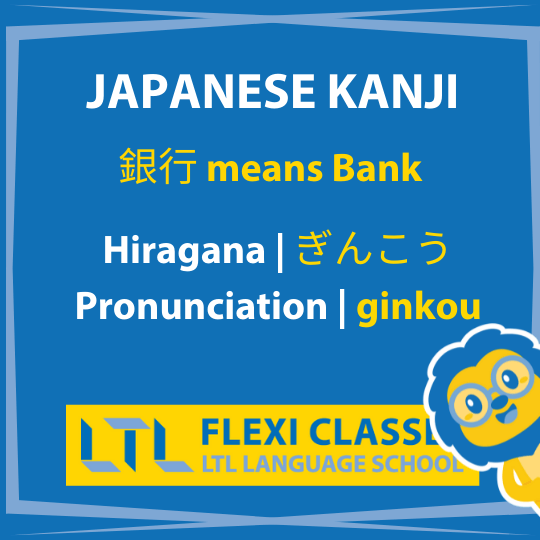
- 銀行 | Bank
- Hiragana | ぎんこう
- Pronunciation | ginkou
- 連れて行く | To take someone along, to take someone (to a place)
- Hiragana | つれていく
- Pronunciation | tsureteiku
- 行ってきます | Set Phrase: I’m off!
- Hiragana | いってきます
- Pronunciation | ittekimasu
- 行ってらっしゃい | Set Phrase: Take care!
- Hiragana | いってらっしゃい
- Pronunciation | itterasshai

Japanese Loanwords 🤩 41 You Should Learn Straight Away
Japanese Loanwords are actually a great way to boost language learning motivation because it makes you realise you can still find similarities with English!
Most Common Kanji #8 | 会
MEANING | To meet
You’ll be sure to meet this Kanji at every company conference or gathering!
| Onyomi | Kunyomi |
|---|---|
| カイ | あ(う) |
Common Usages of 会

- 会う | To meet
- Hiragana | あう
- Pronunciation | au
- 教会 | Church
- Hiragana | きょうかい
- Pronunciation | kyoukai
- 協会 | Association
- Hiragana | きょうかい
- Pronunciation | kyoukai
- 協会 | A conference, A meeting
- Hiragana | かいぎ
- Pronunciation | kaigi
- 機会 | A chance, An opportunity
- Hiragana | きかい
- Pronunciation | kikai
This word is used commonly when talking with friends like ‘if I get a chance, I’d love to!’.
- 会社 | A company
- Hiragana | かいしゃ
- Pronunciation | kaisha
Companies are discussed regularly, in the news, in conversation, and also when talking about job hunting!
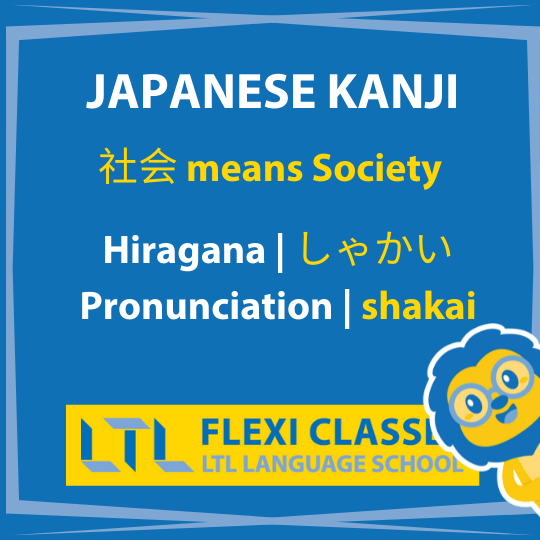
- 会长 | A chairman, President of a company
- Hiragana | かいちょう
- Pronunciation | kaichou
- 社会 | Society
- Hiragana | しゃかい
- Pronunciation | shakai
- 社会人 | A member of society
- Hiragana | しゃかいじん
- Pronunciation | shakaijin
You’ll hear this often because this word is used culturally in Japan with the same connotation as ‘adulting’ or ‘being an adult’ in English. Doing big ‘grown up’ things is like taking your place as ‘a member of society’.
- 再会 | Reunion
- Hiragana | さいかい
- Pronunciation | saikai
- 飲み会 | A drinking party
- Hiragana | のみかい
- Pronunciation | nomikai
A big part of social culture is the drinking parties! In college different school clubs will have drinking parties together and companies will have them after work!
- 宴会 | Banquet
- Hiragana | えんかい
- Pronunciation | enkai
- 会話 | Conversation
- Hiragana | かいわ
- Pronunciation | kaiwa
- 忘年会 | Year-End Party
- Hiragana | ぼうねんかい
- Pronunciation | bounenkai
Most Common Kanji #9 | 生
MEANING | Life
Life without this Kanji is incomplete, literally…
You can’t write life without it! Check out the many ways that life sneaks into commonly used words!
| Onyomi | Kunyomi |
|---|---|
| セイ、 ショウ | い(きる)、 う(む)、 お(う)、 は(える)、 なま |
Common Usages of 生
- 学生 | Student
- Hiragana | がくせい
- Pronunciation | gakusei
There’s 学 we learned before! Combine ‘To study’ and ‘life’ and you get a ‘student’!
- 先生 | Teacher
- Hiragana | せんせい
- Pronunciation | sensei
- 生まれる | To be born
- Hiragana | うまれる
- Pronunciation | umareru
Used often when talking about where someone was born or what year they were born in.
- 生きる | To live
- Hiragana | いきる
- Pronunciation | ikiru
- 生活 | Lifestyle, Livelihood
- Hiragana | せいかつ
- Pronunciation | seikatsu
- 生卵 | Raw Egg
- Hiragana | なまたまご
- Pronunciation | namatamago
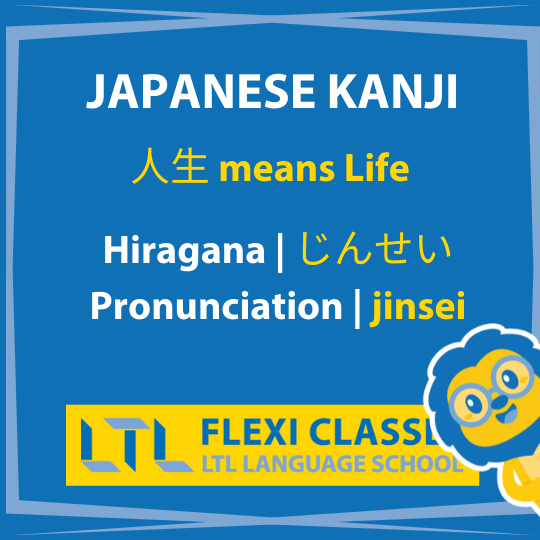
These are actually more common than you might think in Japanese cuisine! But really yummy!
- 生放送 | Live Broadcast
- Hiragana | なまほうそう
- Pronunciation | namahousou
- 人生 | Life
- Hiragana | じんせい
- Pronunciation | jinsei
- 生け花 | Flower arranging
- Hiragana | いけばな
- Pronunciation | ikebana
A beautiful traditional art form in Japanese culture that you’ll see all the time in traditional ceremonies or set ups!
- 誕生日 | Birthday
- Hiragana | たんじょうび
- Pronunciation | tanjoubi
- 生ビール | Draft Beer
- Hiragana | なまびーる
- Pronunciation | namabi-ru
- 生理 | Menstrual Period
- Hiragana | せいり
- Pronunciation | seiri
For all my ladies out there! This is super useful since we’ll be experiencing this every month!
Most Common Kanji #10 | 思
MEANING | To think
You can’t even think without this Kanji!
Here’s the most commonly used instances you’ll see this Kanji pop up in!
| Onyomi | Kunyomi |
|---|---|
| シ | おも(う)、おもえら(く)、おぼ(す) |
Common Usages of 思
- 思い出 | Memory
- Hiragana | おもいで
- Pronunciation | omoide
- 思い切り | With all one’s heart
- Hiragana | おもいきり
- Pronunciation | omoikiri
- 不思議 | Incomprehensible, Marvellous, Wonderful
- Hiragana | ふしぎ
- Pronunciation | fushiqi
A huge level up from your average ‘sugoi’ when reacting to something in surprise! You’ll here this when people are marvelling at something really interesting or captivating!
- 思われている | It is thought
- Hiragana | おもわれている
- Pronunciation | omowareteiru
This is used often when discussing people groups and what’s believed or thought by them. It will also show up in the news when talking about what is thought to have occurred during an incident.
- 思わず | Without thinking, Subconsciously
- Hiragana | おもわず
- Pronunciation | omowazu
- 片思い | Unrequited love
- Hiragana | かたおもい
- Pronunciation | kataomoi
Most likely you would see this used in love song lyrics rather than in daily conversation, but still useful!
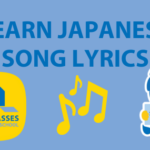
HOW TO – Learn Japanese Lyrics 🎶 The Ultimate Guide
Learning Japanese through Music? You can genuinely learn Japanese by studying Japanese lyrics?! It can be done, and we explain how, step-by-step
Kanji are recycled more than you think!

I hope it was helpful to see in what contexts these 10 commonly used Kanji will show up during your Japanese learning journey!
Pretty soon you’ll be recognising more and more kanji everywhere you go!
Check out the following links for more!
Among the most commonly used Kanji to learn are numbers and Kanji for time.
This video below from our friend Layla will help get you going with the numbers in Japanese and their Kanji equivalents.
After that why not come and check out the 100 most commonly used Kanji – learn a few a day and you’ll be flying in no time!
Japanese Kanji // FREE QUIZ
We aren’t done there friends! We’ve told you everything you need to know, but now it’s your turn.
How well did you remember these 10 Kanji?
We’ll put you to the test, but don’t fear, it’ll take barely a couple of minutes and results are instantly shown on this screen.
See how you do, and share your scores below if you wish!
BONUS CONTENT | Love learning languages? Then why not check out our top 100 Korean words to learn and our mega list of 500 Chinese words to uncover whilst you’re here.
Japanese Kanji // FAQ’s
What does 上 mean?
上 means up or top in Japanese and is one of the most commonly used Kanji there is.
A couple of examples include:
上 | Over
Hiragana | うえ
Pronunciation | ue
—–
上手 | Skilled, Good at, Proficient
Hiragana | じょうず
Pronunciation | jouzu
What does 出口 mean?
This is a word you will see everywhere in Japan.
出口 means exit and is pronounced deguchi.
In Hiragana this is written as でぐち.
What are some Japanese surnames with the Kanji 上?
There are a lot actually but here are some of the most common.
井上
Hiragana | いのうえ
Pronunciation | Inoue
—–
上田
Hiragana | うえだ
Pronunciation | Ueda
—–
上野
Hiragana | うえの
Pronunciation | Ueno (also a district in Tokyo)
—–
村上
Hiragana | むらかみ
Pronunciation | Murakami
—–
上海
Hiragana | シャンハイ
Pronunciation | Shan hai
What does 入口 mean?
入口 means entrance in Japanese and is spoken as iriguchi.
What does 思 mean?
思 is the Kanji for “think”.
An example of a word in Japanese using this Kanji is:
思い出 | Memory
Want More From LTL?
WANT TO LEARN JAPANESE? Check out our online Japanese courses here.
We offer a 7-day free trial to all new students where you can study 24/7.
What about studying Japanese in Japan instead? We’ve got your back. Our Japanese courses in Tokyo can either be taken in small groups of no more than 5 students or individually for a more tailored experience.
We even offer incredible homestay experiences in Tokyo as well.
Come and be a part of this amazing community.











4 comments
Kanji is HARd but I am trying to learn 2-3 a day to make slow progress
Baby steps is the way to go Brad, keep it up.
I have been unable to translate the symbols on this wall hanging that was left in the house I purchased. It must be significant but I have no way of interpreting it. Is there a way to send a photo and get your opinions?
Feel free to Francis